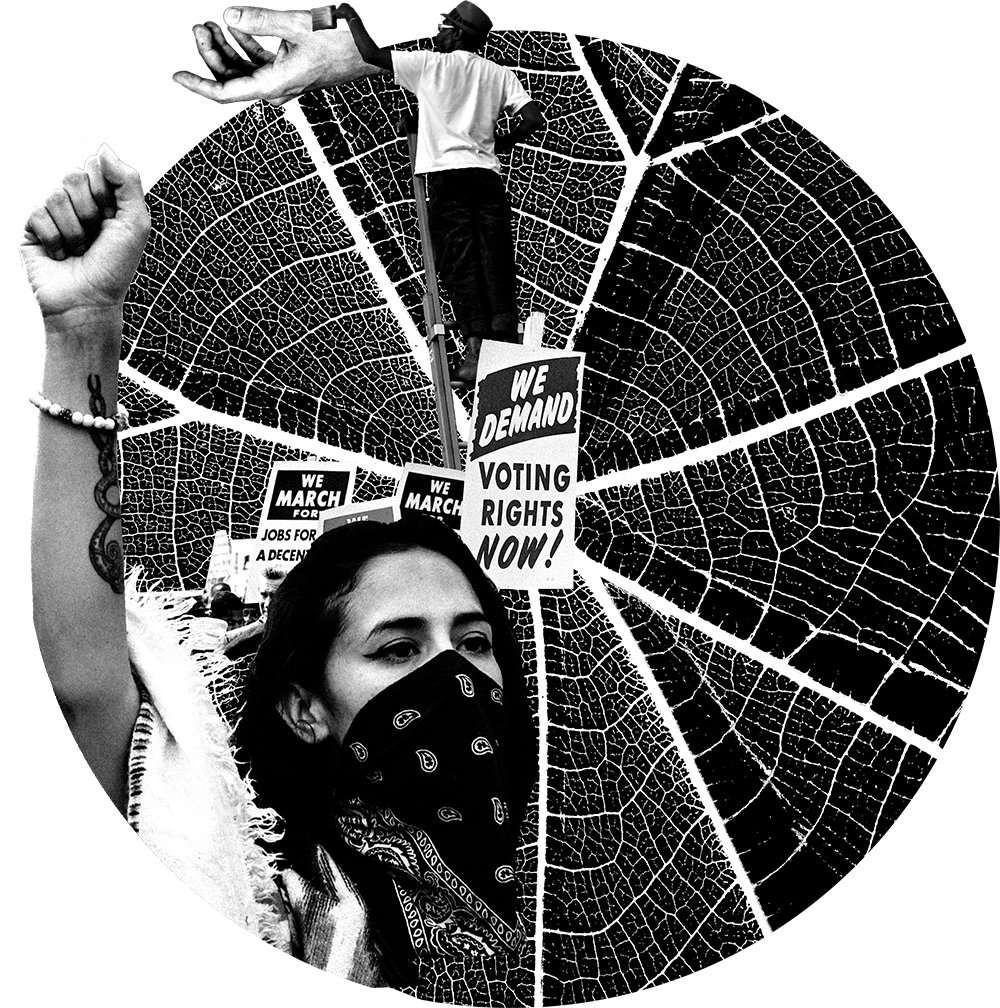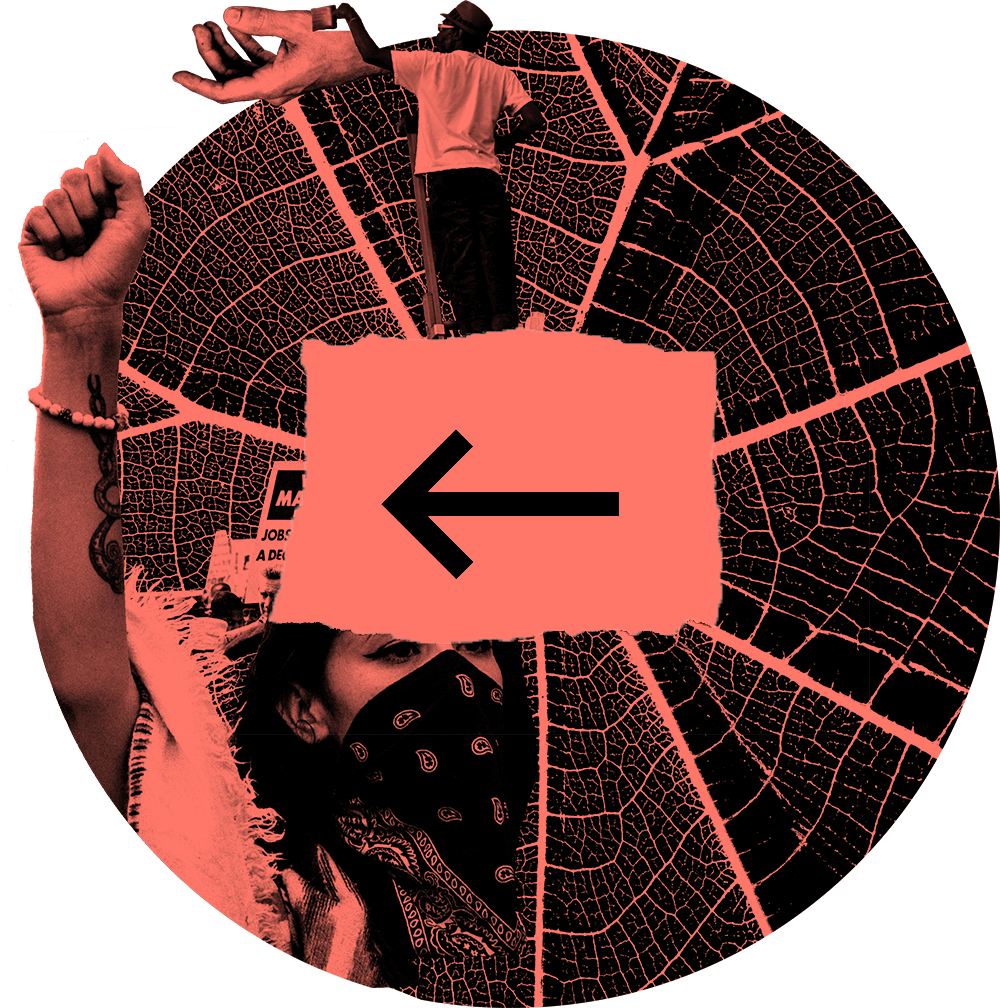Organize
vote to organize!
We yearn for ideal futures, even though they can never be known. We are fascinated by the idea of the greater good, but the only way we can know what is good for all of us is when we come to know and understand one another, find our mutual connections and learn the beauty of our differences. Utopia is perfectly mysterious, but we can start to see it take shape through the shroud of an uncertain future when we work in solidarity with one another. Organizing with your community is the best way to run an activist marathon.
Organizing is most successful when it starts small, is focused, and involves a dedicated, organic, cooperative structure. The easiest way to get involved in organizing is to find fellow members of the community who are the most engaged, representative of the community, and who together can create resources to fulfill the needs of the community. Organizers must all collectively feel a need for change, and be involved in group learning and decision making.
Communities who self-organize in this way should focus on issues that are important to them: environmental justice, queer liberation, dismantling white supremacy, defunding the police, or anything that unites people around a common interest. Prioritize people-powered, grassrootsGrassroots movements are those that start “from the ground up:” based on the hopes and dreams of many everyday people rather than the whims of a few who try to lead the others, and usually without involving money other than to cover the basic necessities of the movement movements over joining a non-profit; you’re likely to be able to make a bigger impact. Avoid seeking out corporate charities in search of activism, as they are typically looking for tax write-offs or marketing opportunities.
Learn about the issue that you want to organize around. Take notes and keep a running list of ideas. Read about existing groups with similar goals or structures and what kind of strategies they’ve had success with.
Talk to people you know. Seek out like-minded friends, family, co-workers, and acquaintances who are passionate about your key issues. Start putting together a casual discussion group.
Meet with the group. Pick a time and a place that is accessible for people. Promote it through word-of-mouth, online, and through flyers if you can. Send out reminders. Split some snacks that you think people might like or are appropriate for the group. Consider dietary restrictions; being thoughtful in small ways like this helps build trust amongst the group.
Set actionable and achievable goals together. Find ways to use your collective powerCollective power refers to what happens when large groups of people start cooperating to take on relatively small numbers of powerful, wealthy individuals and institutions, using their strength in numbers to achieve those goals. Start small and let the ideas build over time. Small victories help keep you motivated for the bigger initiatives. Stay focused on your chosen issue and projects. There will always be others to address in the future but don't let yourselves be distracted by the media cycle—as difficult as that may be. When serious issues arise and require your attention outside of your initiatives, use the collective power of your organization to help other groups when they need it, and they will return the favor.
Involve working class people from many different backgrounds who share your struggle to help amplify your collective voices through democratic decision-making. Find ways to create coherent visions around your diversity of needs. Refer to the Design Activist Institute’s “Commons-Centered Design” or IF’s “Society Centered Design” frameworks if you need additional tips on how to carry this out in practice. Resist infiltration from law enforcement or groups that may intend to harm you, while remaining as open and transparent as possible. Essentially, never say anything in a meeting that you wouldn’t want to be read back in court. If law enforcement attends your meetings, without enough actionable intelligence they will eventually be taken off your case.
Play to the individual strengths of the organizers in your group. Find roles that speak to your strengths and volunteer for them. Encourage and help others to do the same. If the role doesn't exist, find a way to propose the role in a way that fits within the newly-formed bylaws of your group.
Work together to draft bylaws as early as possible—ones that can grow and evolve as living documents. Consider:
- The ways in which people in your organization can propose new ideas
- The format in which meetings will be held
- What the process will be for starting new projects
- How your annual congress will be conducted
Bylaws should also address how people will be organized. Will your organization be completely horizontal and leaderless, or are people too busy to commit to that? Will you have everyone serve terms on a central committee instead? What roles does the group need and how will elections work?
Most importantly, create procedures that protect the vulnerable people in the group. Create a system that involves neutral, impartial roles known as arbitersArbiters are a temporary, neutral role in a community organization, usually elected for a specific and short term, who are responsible for hearing disputes and facilitating conflict resolution who can mediateMediation is a way for conflicts and abuses of power to be resolved through impartial arbiters to help build empathy amongst all participants disputes by listening to both sides and finding solutions that are most appropriate based on the bylaws and repairs the harm done in a process known as adjudicationAdjudication in a community organization involves facilitating conversations between two sides in a conflict and finding resolutions and outcomes that make things better for everyone through transformative justice. Don’t shy away from creating bylaws that give your group and your arbiters the means for removing members who harass others in the group or use activism as a cover for sexual assault.
Ask organizations who inspire you if you can adopt pieces of their bylaws. Meet to debate drafts of your bylaws in order to refine them, and ensure that your bylaws have procedures to amend them as needed in the future.
Look for ways to provide alternative spaces that distribute their benefits equally and are better for people than those which currently exist in society. These spaces could be physical or mental, and can revolve around anything from social life, to politics, to work.
Make your presence known online and in your community. Build a web presence on a pre-existing platform that makes sense for your group and won’t alienate people, or build your own. Put up flyers or wheatpaste posters in your neighborhood. Create and distribute pamphlets.
Socialize with members of the organization. Getting into community organizing can be a big hurdle for a lot of people, and it can help them overcome those barriers by linking political activities with something fun. Screen revolutionary films like Battle of Algiers, Salt of the Earth, or Libertarias, or documentaries like 13th, Hypernormalisation, Zapatista, or any one of countless others. Exercise, cook, or host book clubs together. Put together themed DJ nights or happy hours. The idea is not that everyone in the organization become friends; it is to provide outlets for people to discuss important issues in relaxed settings that aren’t as high-stakes or as stuffy as meetings. Added bonus: social events can get others to join you.
Embrace new ways of thinking and organizing. On a given project, bring everyone to meet with the organization and seek out ways to work together that everyone is happy with. Alternatively, a new coalition can redefine larger and more important goals that everyone can work towards in their own way. Find creative ways for organizers to break your group’s own “rules” democratically: sometimes the only ways to achieve radical objectives is by helping people abandon the ways things were done in the past.
Pick your battles. Avoid escalations that arise as a result of conflicts with other groups or competition over trivial factors like membership numbers or fundraising campaigns. By refusing to participate in these conflicts, you’re interrupting what would likely become an endless cycle of risks and consequences for all. If possible, create new processes that will help move your group from where you are to a better place, possibly preventing future fights.
Plan for the future. Be honest and ask yourself questions that encourage critical thinking about where you succeeded or failed. In organizing, there’s no reason to continue to do things that don’t necessarily get results. Avoid a “drift to low performance” by taking positive lessons from only the best results of your initiatives as new standards moving forward. Accept the bad results as temporary, so that future goals will remember best practices. Don’t do things just because it’s the way you did them in the past, and stay open to new ideas.
Use your power! Once your organization is on solid footing, use your numbers and influence to actively contribute to the larger movement. A mass movement, involving many other people and groups working collectively, is the most effective way to challenge the authoritarian systems which keep us all oppressed.




